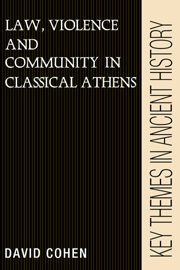Conclusion: litigation, democracy and the courts
Published online by Cambridge University Press: 06 January 2010
Summary
The preceding chapters have sketched an account of Athenian legal practice which departs from most traditional theoretical and historical understandings of the nature and development of the judicial process. Rather than viewing litigation as encompassed within and defined by an autonomous judicial sphere, this account seeks to anchor the conceptualization of litigation in the broader context of agonistic social practices and a field of values organized around notions of honor, competition, hierarchy, and equality. In methodology the approach has been two-pronged. First, I have read Athenian litigation against a variety of contemporary attempts to theorize the judicial process. This theoretical perspective is largely the task of Part I, which also examines in some detail Athenian theoretical accounts of law, conflict, and society. Using such a theoretical approach to frame a study of violence, conflict, and litigation in Athens is important not only because it helps us better to understand the Athenian material. Rather, it has also been a fundamental aim of this study to use the Athenian material as the basis of a critique of certain modern theoretical positions discussed in Chapter I and to provide support for the alternative perspective advanced there. Social history should aim, in my view, not merely at expanding our understanding of the past, but also at engaging the theoretical concerns of the present through which, implicitly or explicitly, such understandings are necessarily shaped.
- Type
- Chapter
- Information
- Law, Violence, and Community in Classical Athens , pp. 181 - 195Publisher: Cambridge University PressPrint publication year: 1995

